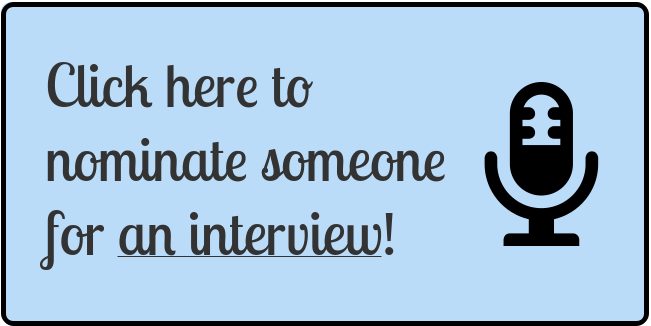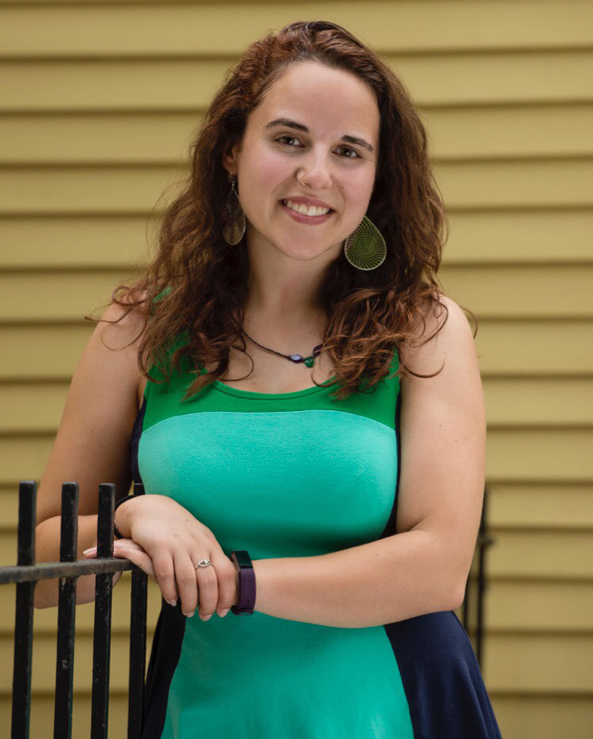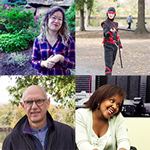Faces Behind the Screen: Anna
Quick Links
<< Return to all “Faces Behind the Screen” stories
Sometimes social media really does help us connect with people!
Anna is one of our loyal Twitter followers and always shows up on our newsfeed for one reason or another — retweeting us, posting something about captions, or talking about current events.
So, we decided to reach out to Anna for an interview. We met up with her in Harvard Square to grab tea and chat before she had class at the Harvard Art Museum.
A Boston-area resident, Anna is three years into taking classes at the Harvard Extension School, working towards a Master’s degree in Museum Studies. Anna is deaf and because she relies on lip reading and her cochlear implant to understand speech, she is very appreciative of how accessible her classes have been. She also works in Guest Services at the Peabody Essex Museum in Salem educating the public, welcoming guests, and… occasionally messing with people when they mistake her “deaf accent” for a foreign accent.
In terms of accessibility, what is it like taking classes through the Harvard Extension?
They have been super helpful. I really never thought I’d be able to get anywhere with classes online. But Harvard has an awesome program. They have captioners for me. […] Most of the videos are captioned. They’re just with it. I don’t think most people even realize how awesome Harvard is in terms of giving you all the accommodations you need.
And I’ve also be working at the Peabody Essex Museum. So that’s what I do outside of class. I’m pretty much a museum person. That’s my world.
“[Sometimes] they’re like, where are you from? And I’m like, I’m from here.”
How did you get into the museum world, and what’s it like working in a museum?
So, my background’s in history. I want to work more with history and museums. I’m hoping to be in education, working with the public, and teaching all kinds of people. That’s important. I’m currently working Guest services, right now so I’m the front of the house.
It’s crazy, though, being front of the house sometimes, because — let me tell you something that’s really crazy that tends to happen to me when they come into the museum. [People say] “Hello! Where are you from?” And I’m like, I’m from here. “Really?” I’m like, yeah.
But then, when I first started working at the museum, my coworkers said, “Just make up a country. See how many people you can fool.” So I tried that. I said, oh, I’m from, Transylvania. Somebody fell for that. But then somebody started saying, “Oh, have you been there? I’ve been there, blah, blah, blah.” And I’m like, never mind, I can’t lie to you. I’m actually deaf. I tried it for a while, but I just have to accept that my accent is a deaf accent and most people don’t know that.
Do you consider yourself deaf or hard of hearing?
I identify myself as deaf, because when I don’t have my ears (hearing aids) in, I really cannot hear anything. But I’m not really — it’s hard because it’s like, I am part of the hearing world, but I’m not really part of the (cultural) Deaf world. I’m kind of in between. So I do say that I’m deaf, because, I mean, I have no hearing in my ears.
I have a hearing aid and an implant.The only reason I got them was that I don’t really know many deaf people and I don’t sign. So, it’s just a thing to help me get by in the world. As I got older, I didn’t want to depend on my parents for everything. I wanted to be able to do things myself. I do identify as deaf, but most of the time it’s different in terms of how other people identify themselves as deaf.
I don’t say I’m hard of hearing. I hate saying that, because, I mean, I’m not really hard of hearing. I really just can’t hear.
“It’s hard because it’s like, I am part of the hearing world, but I’m not really part of the (cultural) Deaf world. I’m kind of in between.”
But every time I do interact with the Deaf community, they’re just so open and welcoming. I have never been pushed away from anything. I just never really had the opportunity in my life. I grew up with hearing parents. My whole family is hearing. They tried to teach me sign language when I was a kid… That didn’t last very long.
I’m a visual kind of person, so I just see what’s around me. And since nobody else was signing around me, I didn’t want to do it. I just want to mimic talking, things like that.
I do want to try and get more involved with [the Deaf community] and learn sign language again at some point. But right now, my life’s too busy.
One thing at a time, right? Do you often have miscommunications with people because of their assumptions about your lipreading ability or knowledge of sign language?
Yeah. Some people just get annoyed at me when I’m like, I’m sorry, I have no idea what you just said. When I was younger, the hardest part was communicating with people who had beards or really hard accents. And I’m like, what? They just get really annoyed at me sometimes. I’m just like, I’m sorry. I don’t know if you know that I’m deaf.
It’s gotten easier with the implant. And I’m more practiced too. Working in the Peabody Essex Museum, I deal with a lot of different people.
“I don’t like having to ask people, “what did they say?” Half the time, people are not even paying attention anyway.”
But outside of juggling things like hunting down RSVP confirmations and figuring out who will be having the filet mignon or the salmon at the wedding reception, Anna says her biggest struggle right now is the lack of accessibility when flying or taking public transportation.
What would you say is your biggest struggle right now?
Right now? When I’m commuting around and there are announcements and things like that, I still have no clue what the hell they’re saying. Like, I’ve flown from airports and I have no idea when they’re calling me to board or anything. I struggle. And I’m like, I wish I knew what they were saying over the intercom. There have been times where they’ve been calling me over the intercom, and I had no clue.
Even at the subway. Even though they have the intercom, that thing’s just generic and I’m not sure what the conductor is saying sometimes. There was a time we all got the train and it broke down for some reason, but I just had no idea how long I was going to be stuck on the train, anything like that. They were just telling people this over the intercom, and I’m like, what’s going on? I don’t like to have to ask people, what did they say? Half the time, people are not even paying attention anyway. There’s no point of asking people.
How do you feel technology helps or hurts your ability to communicate?
I think technology is kind of awesome now. It’s come a long way. I mean, I’ve had cell phones since I was 13 and now it’s so much nicer to text, and I can go on Facebook.
See, this has happened maybe the last six months, where like every video I see has captions. I’m like, well, that’s cool. Now I know what they’re talking about. Some people are like, oh, did you see that video, and I’m like, yeah! So it’s kind of cool that I’m able to interact with people better because of technology. It just helps me be part of the social aspect when I know what’s going on.
I mean, at Harvard, I wouldn’t be able to take this class online if the technology wasn’t this good. The remote captioner, this person that lives in Colorado captions everything that I hear during class. I get to see that all on my screen. I’m like, wow. That’s the awesome part. It could be better, though. I mean, just the moments where I’m like a minute behind the audio and I don’t know what just happened and people are laughing. I’m like, what is the joke?
Now that you realize how included you are now, do you feel like you were excluded before?
A little bit. A lot of people always had up captions on their TVs for me when I was younger, but not everything was there yet. I never went to the movies at all when I was younger, because there were no captions for that. The internet has made that so much better.
What do you wish more hearing people could know about at least your experience?
That my experiences are basically the same as everybody else’s. I mean, sure, I’m deaf, but I still have the same lifestyle as most people. I work, I commute, I deal with the same problems as everybody else, I just don’t hear. So I mean, I just don’t want people to see me differently.
But at the same time, I like being different. So it’s a fine line. I mean, I love being deaf. I wouldn’t change that for the world. People ask me, would you do it over? Would you want to be born hearing? I’m like, no, because I appreciate things a lot more being deaf. And it’s nice to be able to shut out the world if I have to.
“Every person’s different. Some of us sign, some of us don’t. Some of us speak pretty well, some of us have trouble with it. Don’t assume. It’s not fair sometimes.”
What’s a common mistake that hearing people make when they interact you?
People tend to assume. They make assumptions when they meet you. They hear me and they’re like, oh, you’re deaf. Do you use sign language? And I’m like, I don’t know sign language. I’m sorry.
That’s the big thing in my job. I try to teach people, please don’t make assumptions about me. Just because I’m deaf doesn’t mean that I’m like every other deaf person. Every person’s different. Some of us sign, some of us don’t. Some of us speak pretty well, some of us have trouble with it. Don’t assume. It’s not fair sometimes.
What kind of discrimination have you experienced when trying to get a job?
People don’t pick me because they think that there will be a lot of more work, like training, they’ve got to sign… So I’m just hoping that somebody will take a chance on me. Most of my jobs I’ve had because of that one boss whose taken a chance on me. And they all said that they love me. I’m awesome. I think I’m awesome. It’s just getting people to see that.
So that’s the one part of my life that I feel like is not that accessible, like the job role. I know they always say there’s no discrimination, that clause [in the application]. And I’m like, I’m pretty sure you just picked somebody else over me because I don’t like to use the phone. I have no evidence to even prove it. But I think that most of the time, actually.
What’s your proudest moment?
One of my proudest moments, I think, was just getting into college. It was just like an exciting moment where I’m just like, it all came full circle for me. I’ll be OK out there. I can do this. I can leave high school and still be OK out there.
But there have been people in my life who said, you couldn’t do this, you can’t do that. I would love to just go back and meet these people and be like, you fool, I can do that. I haven’t had that moment yet. Still waiting for that moment.
What do you think is the best part of being deaf?
I think the best part of being deaf is that I get to see the world in a different way. I love my mornings where I don’t have to put my ears in yet. I just go about my routine, and it’s just a different world for me. Just my own little world. I love that. It’s my favorite part of my day. If I have to put my ears in, I hear all the noise happening. It’s really nice. It’s really peaceful, and I wish that everybody could have that sometimes.
—
This story was originally published 8/16/2017 and was updated on 2/20/2018.
A huge ‘thank you’ to Anna for taking the time to meet up with us in Harvard Square for this interview.
Would you like to nominate a friend or yourself to be interviewed? Click the link below!

Faces Behind the Screen is a storytelling project focusing on members of the Deaf and hard of hearing community.




